| July 1, 2007
Looking Ahead by Experiencing the Past
 Once in a while a recording is
released that hits me right between the eyes, captures my heart, and cries out for special
treatment. Such is Christopher Columbus: Lost Paradises [SACD, Alia Vox AVSA 9850].
It features the phenomenal soprano Montserrat Figueras, the ensemble Hesperion XXI, and La
Capella Reial de Catalunya, all conducted by Jordi Savall, who apparently can do no wrong
when leading Medieval and Baroque music. Some of his earlier Alia Vox discs have made the
cut for this column, and others have been given high marks by SoundStage!. His
recent SACD of the music of Marin Marais [Alia Vox AVSA 9851] is a definitive account of
that composer’s Suite d’un goút Étranger. Once in a while a recording is
released that hits me right between the eyes, captures my heart, and cries out for special
treatment. Such is Christopher Columbus: Lost Paradises [SACD, Alia Vox AVSA 9850].
It features the phenomenal soprano Montserrat Figueras, the ensemble Hesperion XXI, and La
Capella Reial de Catalunya, all conducted by Jordi Savall, who apparently can do no wrong
when leading Medieval and Baroque music. Some of his earlier Alia Vox discs have made the
cut for this column, and others have been given high marks by SoundStage!. His
recent SACD of the music of Marin Marais [Alia Vox AVSA 9851] is a definitive account of
that composer’s Suite d’un goút Étranger.
This time Savall has put together a cohesive pastiche of
instrumental, vocal, and spoken segments that end up telling not just the story of
Columbus, but the happenings in Spain during 1492. The year that Columbus sailed to the
Americas was also the year the Jews and Moors were expelled from Spain. The contemporary
texts chosen for these two discs tell the three stories, using eyewitness accounts and
music from the era.
The detailed recording allows one to hear every delicate
shading provided by a diverse group of instruments that includes vielle, various flutes,
psaltery, sackbuts, cornetto, chamber organ, and percussion. Often, one or two of these
instruments accompanies Figueras or the small vocal ensemble. The multichannel tracks add
a warm glow to the detail without taking away from it. It is one of the most perfect
recordings I have ever heard, and perhaps the most exquisite.
Alia Vox must have felt so, too. The label has always
produced beautiful covers and booklets, but this time they have outdone themselves. Christopher
Columbus: Lost Paradises comes as a 274-page hardback book that houses the CDs on the
inside covers. It contains essays and texts in seven languages, each section beginning
with a reproduction of an appropriate piece of art. We are now only halfway to December,
but you might want to shop ahead. This set would make a wonderful gift for a music lover
with CD or SACD playback capability.
In the meantime, try these four-star releases:
Vaughan Williams: Symphony No.5 in D; Fantasia
on a Theme by Thomas Tallis; Serenade to Music
Jessica Rivera, soprano; Kelley O’Connor, mezzo-soprano; Thomas Studebaker, tenor;
Nimon Ford, baritone; Cecylia Arzewski, David Arenz, violin; Reid Harris, viola;
Christopher Rex, cello; Atlanta Symphony Orchestra & Chamber Chorus; Robert Spano,
conductor.
Telarc 60676, Hybrid Multichannel SACD.
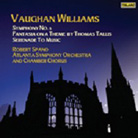 Having stunned the audio
world with its first Vaughan Williams release, the gargantuan Sea Symphony, Telarc
now turns to some of the English composer’s quieter, more reflective music, with
equally outstanding results. Robert Spano seems to understand the heart of this music, and
the magnificent Atlanta musicians constantly astound with their virtuosity and warm-toned
playing. Spano has chosen Vaughan Williams’ alternate version of the sublime Serenade
to Music, for four soloists, chorus, and orchestra. (The original is for 16 solo
singers and orchestra.) The Telarc engineering team has produced one of their
best-sounding SACDs from Atlanta. The strings in the Fantasia on a Theme by Thomas
Tallis sound wonderful, with all sorts of space around them, for a highly transparent
yet cohesive sound. The other two works, for full orchestra, are afforded sound in which
the instrumental choirs are perfectly balanced. The overall perspective is back a few
rows, but the presence doesn’t suffer a bit for that placement. Having stunned the audio
world with its first Vaughan Williams release, the gargantuan Sea Symphony, Telarc
now turns to some of the English composer’s quieter, more reflective music, with
equally outstanding results. Robert Spano seems to understand the heart of this music, and
the magnificent Atlanta musicians constantly astound with their virtuosity and warm-toned
playing. Spano has chosen Vaughan Williams’ alternate version of the sublime Serenade
to Music, for four soloists, chorus, and orchestra. (The original is for 16 solo
singers and orchestra.) The Telarc engineering team has produced one of their
best-sounding SACDs from Atlanta. The strings in the Fantasia on a Theme by Thomas
Tallis sound wonderful, with all sorts of space around them, for a highly transparent
yet cohesive sound. The other two works, for full orchestra, are afforded sound in which
the instrumental choirs are perfectly balanced. The overall perspective is back a few
rows, but the presence doesn’t suffer a bit for that placement.
Ernest Ranglin: Order of Distinction
AIX 83047, DVD-Audio/Video/CD. Mixes: MLP, DTS, Dolby Digital 5.1 Audience, 5.1 Stage,
24-bit/96kHz 2.0, 16-bit/44.1kHz 2.0.
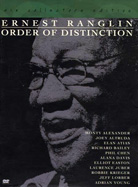 Guitarist Ernest Ranglin is credited as
being one of the pioneers of Jamaican music. In the 1950s he helped develop ska, a music
that incorporated Caribbean influences, calypso, and American jazz. The style, which
accents the offbeats, took Jamaica by storm and laid the foundation for the reggae
explosion of the 1970s, led by Bob Marley. In 1964, before Jamaican music was popular in
the US, Ranglin arranged "My Boy Lollipop" for Millie Small; the single became a
great hit in America. This new recording features Ranglin with some great names in jazz
and pop, including Monty Alexander, Robbie Krieger, Elliot Easton, and Alana Davis. As has
come to be expected from AIX, the sound is first rate. The MLP multichannel mixes are the
best, with clarity, warmth, and an overall naturalness of sound with good presence. Also
as usual, there are many other mixes (listed above), and all are excellent. Other labels
are now catching on, but AIX was at the forefront in creating releases that can be enjoyed
on any player. This one also includes hi-def videos of the recording sessions that show
great detail and have superb contrast. I believe they are the best video work AIX has done
thus far. There are many other extras -- bios, interviews, documentaries -- but the sound
is the thing, and in that department this disc wins easily. Guitarist Ernest Ranglin is credited as
being one of the pioneers of Jamaican music. In the 1950s he helped develop ska, a music
that incorporated Caribbean influences, calypso, and American jazz. The style, which
accents the offbeats, took Jamaica by storm and laid the foundation for the reggae
explosion of the 1970s, led by Bob Marley. In 1964, before Jamaican music was popular in
the US, Ranglin arranged "My Boy Lollipop" for Millie Small; the single became a
great hit in America. This new recording features Ranglin with some great names in jazz
and pop, including Monty Alexander, Robbie Krieger, Elliot Easton, and Alana Davis. As has
come to be expected from AIX, the sound is first rate. The MLP multichannel mixes are the
best, with clarity, warmth, and an overall naturalness of sound with good presence. Also
as usual, there are many other mixes (listed above), and all are excellent. Other labels
are now catching on, but AIX was at the forefront in creating releases that can be enjoyed
on any player. This one also includes hi-def videos of the recording sessions that show
great detail and have superb contrast. I believe they are the best video work AIX has done
thus far. There are many other extras -- bios, interviews, documentaries -- but the sound
is the thing, and in that department this disc wins easily.
J.S. Bach: Cantatas: No.205, "Der
zufriedengestellte Äolus"; No.110, "Unser Mund sei
voll Lachens"
Nancy Argenta, Cluadia Iten, Rosa Dominguez, Klaus Mertens, Charles Daniels; Coro della
Radio Svizzera, Lugano; I Barocchisti; Diego Fasolis, conductor.
Arts Music 47717, Hybrid Multichannel SACD
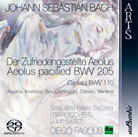 Dr. August Friedrich Müller
was a popular professor at the University of Leipzig. His students thought so much of him
that, in 1725, they commissioned a cantata for his birthday. The composer was none other
than Johann Sebastian Bach. The resultant work, "Der zufriedengestellte Äolus,"
is a four-character scena, with arias and recitative, in which Zephyrus, god of the
gentle west wind of summer, begs Äolus, the chief wind god, to delay the onset of winter.
After several entreaties, the reason finally becomes known: It is the birthday of Augustus
Friedrich Müller. Faced with that, Äolus gives in. A little later in 1725, Bach,
fulfilling his duties as director of music at two Leipzig churches, composed his Cantata
No.110, "Unser Mund sei voll Lachens." The beginning of this cantata will sound
familiar, as it is based on the opening of his Orchestral Suite No.3. Through his Arts
Music releases of the Orchestral Suites and Brandenburg Concertos, I have greatly admired
the energy and detail that conductor Diego Fasolis brings to his joyous readings of
Bach’s music, and these cantatas, too, bubble with good nature. The opening chorus of
No.205, with its trumpet fanfares and timpani strokes, is blazing and brilliant. The
soloists are each perfect, and the chorus navigates its terribly intricate passages with
ease while maintaining good tone throughout. The recording, as usual with Arts Music
releases, is perfectly balanced in all departments, and has uniquely good presence. We
cannot know what that first performance of Cantata No.205 sounded like in 1725, but if Dr.
Müller had heard this one, he couldn’t have been anything but pleased. Dr. August Friedrich Müller
was a popular professor at the University of Leipzig. His students thought so much of him
that, in 1725, they commissioned a cantata for his birthday. The composer was none other
than Johann Sebastian Bach. The resultant work, "Der zufriedengestellte Äolus,"
is a four-character scena, with arias and recitative, in which Zephyrus, god of the
gentle west wind of summer, begs Äolus, the chief wind god, to delay the onset of winter.
After several entreaties, the reason finally becomes known: It is the birthday of Augustus
Friedrich Müller. Faced with that, Äolus gives in. A little later in 1725, Bach,
fulfilling his duties as director of music at two Leipzig churches, composed his Cantata
No.110, "Unser Mund sei voll Lachens." The beginning of this cantata will sound
familiar, as it is based on the opening of his Orchestral Suite No.3. Through his Arts
Music releases of the Orchestral Suites and Brandenburg Concertos, I have greatly admired
the energy and detail that conductor Diego Fasolis brings to his joyous readings of
Bach’s music, and these cantatas, too, bubble with good nature. The opening chorus of
No.205, with its trumpet fanfares and timpani strokes, is blazing and brilliant. The
soloists are each perfect, and the chorus navigates its terribly intricate passages with
ease while maintaining good tone throughout. The recording, as usual with Arts Music
releases, is perfectly balanced in all departments, and has uniquely good presence. We
cannot know what that first performance of Cantata No.205 sounded like in 1725, but if Dr.
Müller had heard this one, he couldn’t have been anything but pleased.
Tippett: The Rose Lake; Ritual
Dances from The Midsummer Marriage
BBC National Orchestra of Wales; Richard Hickox, conductor.
Chandos CHSA5039, Hybrid Multichannel SACD.
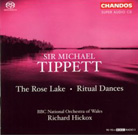 Sir Michael Tippett lived a long life
(1905-1998) and was still composing in his 90s. The Rose Lake: A Song Without
Words for Orchestra was written in 1993. The composer’s operatic masterpiece, The
Midsummer Marriage, was completed in 1952, and performed at Covent Garden in 1955.
Dancers are featured in four scenes, and just before the opera’s premiere, Tippett
arranged these dances, along with their introductions and transformations, as an
orchestral suite. These works have in common the delicate use of exotic percussion
instruments -- The Rose Lake, in particular, shimmers with harp, xylophone, chimes,
roto-tome, and more. It is amazing that such a large group of musicians can produce such
delicate sounds. Richard Hickox leads both compositions with imagination and keen
attention to their lyrical properties. The nearly perfect recording reveals the
chamber-music-like passages with utmost clarity, yet has heft enough for the few full
orchestral outbreaks. The hall ambience is perfect. I wasn’t aware of the rear
speakers while listening, but when I switched to the otherwise excellent two-channel
tracks, I missed them. Sir Michael Tippett lived a long life
(1905-1998) and was still composing in his 90s. The Rose Lake: A Song Without
Words for Orchestra was written in 1993. The composer’s operatic masterpiece, The
Midsummer Marriage, was completed in 1952, and performed at Covent Garden in 1955.
Dancers are featured in four scenes, and just before the opera’s premiere, Tippett
arranged these dances, along with their introductions and transformations, as an
orchestral suite. These works have in common the delicate use of exotic percussion
instruments -- The Rose Lake, in particular, shimmers with harp, xylophone, chimes,
roto-tome, and more. It is amazing that such a large group of musicians can produce such
delicate sounds. Richard Hickox leads both compositions with imagination and keen
attention to their lyrical properties. The nearly perfect recording reveals the
chamber-music-like passages with utmost clarity, yet has heft enough for the few full
orchestral outbreaks. The hall ambience is perfect. I wasn’t aware of the rear
speakers while listening, but when I switched to the otherwise excellent two-channel
tracks, I missed them.
Tchaikovsky: The Nutcracker (complete),
Swan Lake (excerpts), Polonaise from Eugene Onegin
Bolshoi Theater Orchestra; Alexander Vedernikov, conductor.
PentaTone 5186 091, Hybrid Multichannel SACD.
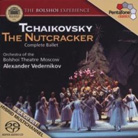 How different this recording of the
Bolshoi Theater Orchestra is from those made in the past. Back then, the sound was
dreadful, and the orchestra, too, was a bit rough around the edges. The Bolshoi has
certainly improved over the years, and PentaTone brings to this recording the latest in
cutting-edge technology. This is a very dance-like, lyrical performance that is not
without drama when that is needed. The orchestra has no doubt performed these works a
dozen times a year for decades, but their alert playing indicates they have not become
bored. The recording is very natural, and all of Tchaikovsky’s colorful orchestration
comes through without harsh highlighting. Special effects -- celesta, cymbals, a
children’s chorus, a toy gun, a ratchet -- are easily heard, yet are exactly balanced
with the orchestra. The soundstage is wide and deep, and the surrounds provide just the
right amount of hall ambience. It sounds good in two-channel stereo, too, but the
multichannel mix has more sparkle. It’s only July -- you have plenty of time to buy a
copy before the holidays are upon us. This is one of the best Nutcrackers in the
catalog. How different this recording of the
Bolshoi Theater Orchestra is from those made in the past. Back then, the sound was
dreadful, and the orchestra, too, was a bit rough around the edges. The Bolshoi has
certainly improved over the years, and PentaTone brings to this recording the latest in
cutting-edge technology. This is a very dance-like, lyrical performance that is not
without drama when that is needed. The orchestra has no doubt performed these works a
dozen times a year for decades, but their alert playing indicates they have not become
bored. The recording is very natural, and all of Tchaikovsky’s colorful orchestration
comes through without harsh highlighting. Special effects -- celesta, cymbals, a
children’s chorus, a toy gun, a ratchet -- are easily heard, yet are exactly balanced
with the orchestra. The soundstage is wide and deep, and the surrounds provide just the
right amount of hall ambience. It sounds good in two-channel stereo, too, but the
multichannel mix has more sparkle. It’s only July -- you have plenty of time to buy a
copy before the holidays are upon us. This is one of the best Nutcrackers in the
catalog.
Claire Martin: He Never Mentioned Love
Linn AKD 295, Hybrid Multichannel SACD.
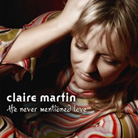 This lush-sounding SACD, a
tribute to the late Shirley Horn, demonstrates a new maturity for Claire Martin, a singer
already blessed with many gifts. Her voice is now a little darker; some of the long notes
seem less sung than exhaled from her soul. Like Horn, she sings directly and without
artifice, and in this album’s many songs about lost love she will break your heart,
as Horn always did. There are familiar songs, such as "Everything Must Change,"
"Travelling Light," and "If You Go," which is given the best treatment
I have heard. There are also two new songs in tribute to Horn: "Slowly But
Shirley" and "Slow Time." Linn’s recording is rich and warm, with an
ideal balance of voice and instruments. The sound is up front in the left, center, and
right channels; the rear channels just warm things up a bit by providing an ideal amount
of ambient sound. This lush-sounding SACD, a
tribute to the late Shirley Horn, demonstrates a new maturity for Claire Martin, a singer
already blessed with many gifts. Her voice is now a little darker; some of the long notes
seem less sung than exhaled from her soul. Like Horn, she sings directly and without
artifice, and in this album’s many songs about lost love she will break your heart,
as Horn always did. There are familiar songs, such as "Everything Must Change,"
"Travelling Light," and "If You Go," which is given the best treatment
I have heard. There are also two new songs in tribute to Horn: "Slowly But
Shirley" and "Slow Time." Linn’s recording is rich and warm, with an
ideal balance of voice and instruments. The sound is up front in the left, center, and
right channels; the rear channels just warm things up a bit by providing an ideal amount
of ambient sound.
...Rad Bennett
radb@ultraaudio.com

All contents copyright Schneider Publishing Inc., all rights
reserved.
Any reproduction, without permission, is prohibited.
Ultra Audio is part of the SoundStage! Network.
A world of websites and publications for audio, video, music, and movie enthusiasts. |

 Once in a while a recording is
released that hits me right between the eyes, captures my heart, and cries out for special
treatment. Such is Christopher Columbus: Lost Paradises [SACD, Alia Vox AVSA 9850].
It features the phenomenal soprano Montserrat Figueras, the ensemble Hesperion XXI, and La
Capella Reial de Catalunya, all conducted by Jordi Savall, who apparently can do no wrong
when leading Medieval and Baroque music. Some of his earlier Alia Vox discs have made the
cut for this column, and others have been given high marks by SoundStage!. His
recent SACD of the music of Marin Marais [Alia Vox AVSA 9851] is a definitive account of
that composer’s Suite d’un goút Étranger.
Once in a while a recording is
released that hits me right between the eyes, captures my heart, and cries out for special
treatment. Such is Christopher Columbus: Lost Paradises [SACD, Alia Vox AVSA 9850].
It features the phenomenal soprano Montserrat Figueras, the ensemble Hesperion XXI, and La
Capella Reial de Catalunya, all conducted by Jordi Savall, who apparently can do no wrong
when leading Medieval and Baroque music. Some of his earlier Alia Vox discs have made the
cut for this column, and others have been given high marks by SoundStage!. His
recent SACD of the music of Marin Marais [Alia Vox AVSA 9851] is a definitive account of
that composer’s Suite d’un goút Étranger. Having stunned the audio
world with its first Vaughan Williams release, the gargantuan Sea Symphony, Telarc
now turns to some of the English composer’s quieter, more reflective music, with
equally outstanding results. Robert Spano seems to understand the heart of this music, and
the magnificent Atlanta musicians constantly astound with their virtuosity and warm-toned
playing. Spano has chosen Vaughan Williams’ alternate version of the sublime Serenade
to Music, for four soloists, chorus, and orchestra. (The original is for 16 solo
singers and orchestra.) The Telarc engineering team has produced one of their
best-sounding SACDs from Atlanta. The strings in the Fantasia on a Theme by Thomas
Tallis sound wonderful, with all sorts of space around them, for a highly transparent
yet cohesive sound. The other two works, for full orchestra, are afforded sound in which
the instrumental choirs are perfectly balanced. The overall perspective is back a few
rows, but the presence doesn’t suffer a bit for that placement.
Having stunned the audio
world with its first Vaughan Williams release, the gargantuan Sea Symphony, Telarc
now turns to some of the English composer’s quieter, more reflective music, with
equally outstanding results. Robert Spano seems to understand the heart of this music, and
the magnificent Atlanta musicians constantly astound with their virtuosity and warm-toned
playing. Spano has chosen Vaughan Williams’ alternate version of the sublime Serenade
to Music, for four soloists, chorus, and orchestra. (The original is for 16 solo
singers and orchestra.) The Telarc engineering team has produced one of their
best-sounding SACDs from Atlanta. The strings in the Fantasia on a Theme by Thomas
Tallis sound wonderful, with all sorts of space around them, for a highly transparent
yet cohesive sound. The other two works, for full orchestra, are afforded sound in which
the instrumental choirs are perfectly balanced. The overall perspective is back a few
rows, but the presence doesn’t suffer a bit for that placement. Guitarist Ernest Ranglin is credited as
being one of the pioneers of Jamaican music. In the 1950s he helped develop ska, a music
that incorporated Caribbean influences, calypso, and American jazz. The style, which
accents the offbeats, took Jamaica by storm and laid the foundation for the reggae
explosion of the 1970s, led by Bob Marley. In 1964, before Jamaican music was popular in
the US, Ranglin arranged "My Boy Lollipop" for Millie Small; the single became a
great hit in America. This new recording features Ranglin with some great names in jazz
and pop, including Monty Alexander, Robbie Krieger, Elliot Easton, and Alana Davis. As has
come to be expected from AIX, the sound is first rate. The MLP multichannel mixes are the
best, with clarity, warmth, and an overall naturalness of sound with good presence. Also
as usual, there are many other mixes (listed above), and all are excellent. Other labels
are now catching on, but AIX was at the forefront in creating releases that can be enjoyed
on any player. This one also includes hi-def videos of the recording sessions that show
great detail and have superb contrast. I believe they are the best video work AIX has done
thus far. There are many other extras -- bios, interviews, documentaries -- but the sound
is the thing, and in that department this disc wins easily.
Guitarist Ernest Ranglin is credited as
being one of the pioneers of Jamaican music. In the 1950s he helped develop ska, a music
that incorporated Caribbean influences, calypso, and American jazz. The style, which
accents the offbeats, took Jamaica by storm and laid the foundation for the reggae
explosion of the 1970s, led by Bob Marley. In 1964, before Jamaican music was popular in
the US, Ranglin arranged "My Boy Lollipop" for Millie Small; the single became a
great hit in America. This new recording features Ranglin with some great names in jazz
and pop, including Monty Alexander, Robbie Krieger, Elliot Easton, and Alana Davis. As has
come to be expected from AIX, the sound is first rate. The MLP multichannel mixes are the
best, with clarity, warmth, and an overall naturalness of sound with good presence. Also
as usual, there are many other mixes (listed above), and all are excellent. Other labels
are now catching on, but AIX was at the forefront in creating releases that can be enjoyed
on any player. This one also includes hi-def videos of the recording sessions that show
great detail and have superb contrast. I believe they are the best video work AIX has done
thus far. There are many other extras -- bios, interviews, documentaries -- but the sound
is the thing, and in that department this disc wins easily. Dr. August Friedrich Müller
was a popular professor at the University of Leipzig. His students thought so much of him
that, in 1725, they commissioned a cantata for his birthday. The composer was none other
than Johann Sebastian Bach. The resultant work, "Der zufriedengestellte Äolus,"
is a four-character scena, with arias and recitative, in which Zephyrus, god of the
gentle west wind of summer, begs Äolus, the chief wind god, to delay the onset of winter.
After several entreaties, the reason finally becomes known: It is the birthday of Augustus
Friedrich Müller. Faced with that, Äolus gives in. A little later in 1725, Bach,
fulfilling his duties as director of music at two Leipzig churches, composed his Cantata
No.110, "Unser Mund sei voll Lachens." The beginning of this cantata will sound
familiar, as it is based on the opening of his Orchestral Suite No.3. Through his Arts
Music releases of the Orchestral Suites and Brandenburg Concertos, I have greatly admired
the energy and detail that conductor Diego Fasolis brings to his joyous readings of
Bach’s music, and these cantatas, too, bubble with good nature. The opening chorus of
No.205, with its trumpet fanfares and timpani strokes, is blazing and brilliant. The
soloists are each perfect, and the chorus navigates its terribly intricate passages with
ease while maintaining good tone throughout. The recording, as usual with Arts Music
releases, is perfectly balanced in all departments, and has uniquely good presence. We
cannot know what that first performance of Cantata No.205 sounded like in 1725, but if Dr.
Müller had heard this one, he couldn’t have been anything but pleased.
Dr. August Friedrich Müller
was a popular professor at the University of Leipzig. His students thought so much of him
that, in 1725, they commissioned a cantata for his birthday. The composer was none other
than Johann Sebastian Bach. The resultant work, "Der zufriedengestellte Äolus,"
is a four-character scena, with arias and recitative, in which Zephyrus, god of the
gentle west wind of summer, begs Äolus, the chief wind god, to delay the onset of winter.
After several entreaties, the reason finally becomes known: It is the birthday of Augustus
Friedrich Müller. Faced with that, Äolus gives in. A little later in 1725, Bach,
fulfilling his duties as director of music at two Leipzig churches, composed his Cantata
No.110, "Unser Mund sei voll Lachens." The beginning of this cantata will sound
familiar, as it is based on the opening of his Orchestral Suite No.3. Through his Arts
Music releases of the Orchestral Suites and Brandenburg Concertos, I have greatly admired
the energy and detail that conductor Diego Fasolis brings to his joyous readings of
Bach’s music, and these cantatas, too, bubble with good nature. The opening chorus of
No.205, with its trumpet fanfares and timpani strokes, is blazing and brilliant. The
soloists are each perfect, and the chorus navigates its terribly intricate passages with
ease while maintaining good tone throughout. The recording, as usual with Arts Music
releases, is perfectly balanced in all departments, and has uniquely good presence. We
cannot know what that first performance of Cantata No.205 sounded like in 1725, but if Dr.
Müller had heard this one, he couldn’t have been anything but pleased. Sir Michael Tippett lived a long life
(1905-1998) and was still composing in his 90s. The Rose Lake: A Song Without
Words for Orchestra was written in 1993. The composer’s operatic masterpiece, The
Midsummer Marriage, was completed in 1952, and performed at Covent Garden in 1955.
Dancers are featured in four scenes, and just before the opera’s premiere, Tippett
arranged these dances, along with their introductions and transformations, as an
orchestral suite. These works have in common the delicate use of exotic percussion
instruments -- The Rose Lake, in particular, shimmers with harp, xylophone, chimes,
roto-tome, and more. It is amazing that such a large group of musicians can produce such
delicate sounds. Richard Hickox leads both compositions with imagination and keen
attention to their lyrical properties. The nearly perfect recording reveals the
chamber-music-like passages with utmost clarity, yet has heft enough for the few full
orchestral outbreaks. The hall ambience is perfect. I wasn’t aware of the rear
speakers while listening, but when I switched to the otherwise excellent two-channel
tracks, I missed them.
Sir Michael Tippett lived a long life
(1905-1998) and was still composing in his 90s. The Rose Lake: A Song Without
Words for Orchestra was written in 1993. The composer’s operatic masterpiece, The
Midsummer Marriage, was completed in 1952, and performed at Covent Garden in 1955.
Dancers are featured in four scenes, and just before the opera’s premiere, Tippett
arranged these dances, along with their introductions and transformations, as an
orchestral suite. These works have in common the delicate use of exotic percussion
instruments -- The Rose Lake, in particular, shimmers with harp, xylophone, chimes,
roto-tome, and more. It is amazing that such a large group of musicians can produce such
delicate sounds. Richard Hickox leads both compositions with imagination and keen
attention to their lyrical properties. The nearly perfect recording reveals the
chamber-music-like passages with utmost clarity, yet has heft enough for the few full
orchestral outbreaks. The hall ambience is perfect. I wasn’t aware of the rear
speakers while listening, but when I switched to the otherwise excellent two-channel
tracks, I missed them. How different this recording of the
Bolshoi Theater Orchestra is from those made in the past. Back then, the sound was
dreadful, and the orchestra, too, was a bit rough around the edges. The Bolshoi has
certainly improved over the years, and PentaTone brings to this recording the latest in
cutting-edge technology. This is a very dance-like, lyrical performance that is not
without drama when that is needed. The orchestra has no doubt performed these works a
dozen times a year for decades, but their alert playing indicates they have not become
bored. The recording is very natural, and all of Tchaikovsky’s colorful orchestration
comes through without harsh highlighting. Special effects -- celesta, cymbals, a
children’s chorus, a toy gun, a ratchet -- are easily heard, yet are exactly balanced
with the orchestra. The soundstage is wide and deep, and the surrounds provide just the
right amount of hall ambience. It sounds good in two-channel stereo, too, but the
multichannel mix has more sparkle. It’s only July -- you have plenty of time to buy a
copy before the holidays are upon us. This is one of the best Nutcrackers in the
catalog.
How different this recording of the
Bolshoi Theater Orchestra is from those made in the past. Back then, the sound was
dreadful, and the orchestra, too, was a bit rough around the edges. The Bolshoi has
certainly improved over the years, and PentaTone brings to this recording the latest in
cutting-edge technology. This is a very dance-like, lyrical performance that is not
without drama when that is needed. The orchestra has no doubt performed these works a
dozen times a year for decades, but their alert playing indicates they have not become
bored. The recording is very natural, and all of Tchaikovsky’s colorful orchestration
comes through without harsh highlighting. Special effects -- celesta, cymbals, a
children’s chorus, a toy gun, a ratchet -- are easily heard, yet are exactly balanced
with the orchestra. The soundstage is wide and deep, and the surrounds provide just the
right amount of hall ambience. It sounds good in two-channel stereo, too, but the
multichannel mix has more sparkle. It’s only July -- you have plenty of time to buy a
copy before the holidays are upon us. This is one of the best Nutcrackers in the
catalog. This lush-sounding SACD, a
tribute to the late Shirley Horn, demonstrates a new maturity for Claire Martin, a singer
already blessed with many gifts. Her voice is now a little darker; some of the long notes
seem less sung than exhaled from her soul. Like Horn, she sings directly and without
artifice, and in this album’s many songs about lost love she will break your heart,
as Horn always did. There are familiar songs, such as "Everything Must Change,"
"Travelling Light," and "If You Go," which is given the best treatment
I have heard. There are also two new songs in tribute to Horn: "Slowly But
Shirley" and "Slow Time." Linn’s recording is rich and warm, with an
ideal balance of voice and instruments. The sound is up front in the left, center, and
right channels; the rear channels just warm things up a bit by providing an ideal amount
of ambient sound.
This lush-sounding SACD, a
tribute to the late Shirley Horn, demonstrates a new maturity for Claire Martin, a singer
already blessed with many gifts. Her voice is now a little darker; some of the long notes
seem less sung than exhaled from her soul. Like Horn, she sings directly and without
artifice, and in this album’s many songs about lost love she will break your heart,
as Horn always did. There are familiar songs, such as "Everything Must Change,"
"Travelling Light," and "If You Go," which is given the best treatment
I have heard. There are also two new songs in tribute to Horn: "Slowly But
Shirley" and "Slow Time." Linn’s recording is rich and warm, with an
ideal balance of voice and instruments. The sound is up front in the left, center, and
right channels; the rear channels just warm things up a bit by providing an ideal amount
of ambient sound.